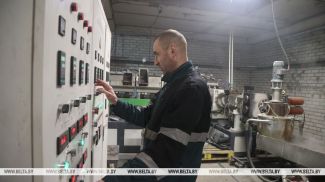MINSK, 3 January (BelTA) – Prices for industrial timber continue to decline at the Belarusian Universal Commodity Exchange, spokesman for the Belarusian Universal Commodity Exchange (BUCE) Roman Yaniv told BelTA.
"In Q4 2021, the price for round timber in the domestic market continued to decline. For example, prices for high-quality softwood of A and B grades plummeted by an average of 35%, and low-quality timber - by 30%," Roman Yaniv said.
According to BUCE analysts, the downward price trend was facilitated primarily by the annual auctions in timber , with 60% of the planned annual volume put up for sale, rather than 40% as in previous years. In addition, BUCE applied a new bidding mechanism with a division into consumer sections without restrictions as to the number of participants. As a result, manufacturers of different types of products did not have to compete with each other for the same resource, which prevented an unreasonable increase in prices for the most popular types of raw materials.
In general, by the end of 2021, prices for industrial timber stabilized and the decline in quotations was no longer as significant as in October- November. Prices for round hardwood timber, depending on the variety, diameter and terms of delivery, reduced by 5% in December over November, high-quality softwood of A and B grades went down by 6%, and low-quality raw materials of coniferous species of grades C and D - by 5%.
"With the current ratio of supply and demand, the probability of serious price fluctuations in the domestic market is minimal, especially since the main consumers have already satisfied their needs last year. Based on this, we expect that prices for round timber for domestic buyers will not fundamentally change,” BUCE believes.
The public joint-stock company (OAO) Belarusian Universal Commodity Exchange was established in 2004. The first trade sessions took place in June 2005. BUCE is one of the largest mercantile exchanges in Eastern Europe. Its key function is to assist Belarusian companies with exporting their products and assist foreign companies with entering the Belarusian market. The commodity exchange facilitates trade in metals, timber, agricultural products, and a broad choice of industrial and consumer goods.













